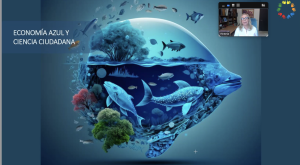
Ayer, 17 de enero, se llevó a cabo un evento preparatorio a la Conferencia Mundial sobre Educación Cultural y Artística de la UNESCO, que tendrá lugar del 13 al 15 de febrero en Abu Dhabi.
Esta presentación audiovisual contó con la presencia de la Universidad Politécnica de Valencia, la Universidad de Sevilla, la Universidad del País Vasco, la Universidad Tres de Febrero de Buenos Aires, la Pontificia Universidad Católica de Valparaíso y el Instituto Nacional de Patrimonio de Quito.
Este encuentro iberoamericano de Cátedras Hermanas sirvió de espacio para compartir y debatir sobre la importancia de la educación artística y la cultura y el papel fundamental que juega ésta última en la consecución de los Objetivos de Desarrollo Sostenible de la Agenda 2030.
El patrimonio cultural ha sido y es una herramienta de desarrollo, que tiene la capacidad de integrar distintos elementos de identidad y que, con ello, desempeña un papel integral en la preservación del patrimonio como memoria colectiva.
El patrimonio necesita entenderse como un medio para que la sociedad reconozca e internalice sus propias capacidades creativas y transformadoras. Así, el objetivo de este evento previo es dar a conocer las distintas líneas de acción desde el ámbito académico en la formación de los estudiantes en materia de patrimonio con una mirada fija desde el siglo XXI. Del mismo modo, convocar a las Cátedras UNESCO Iberoamericanas para hacer evidente la necesidad y el deseo de trabajar en conjunto para la protección y difusión de nuestro Patrimonio Cultural.
La Cátedra Unesco Forum Universidad y Patrimonio Cultural de la Universidad Politécnica de Valencia estuvo presente en el evento, a través de su directora, María Victoria Vivancos, quien presentó las distintas actividades y proyectos llevados a cabo en la Cátedra durante los últimos años, favoreciendo y promoviendo así, la educación patrimonial.
Además, Ocean Art Project estuvo presente durante la intervención de la Cátedra como ejemplo de educación patrimonial, a través de su principal objetivo, que en este caso es la divulgación del conocimiento del patrimonio cultural marino, material e inmaterial en infancia y juventud.
__
Yesterday, 17 January, a preparatory event was held for the UNESCO World Conference on Cultural and Arts Education, which will take place from 13 to 15 February in Abu Dhabi.
This audiovisual presentation was attended by the Polytechnic University of Valencia, the University of Seville, the University of the Basque Country, the Tres de Febrero University of Buenos Aires, the Pontifical Catholic University of Valparaiso and the National Heritage Institute of Quito.
This Ibero-American meeting of Sister Chairs served as a space for sharing and discussing the importance of arts education and culture and the fundamental role that the latter plays in achieving the Sustainable Development Goals of the 2030 Agenda.
Cultural heritage has been and is a tool for development, which has the capacity to integrate different elements of identity and thus plays an integral role in the preservation of heritage as collective memory.
Heritage needs to be understood as a means for society to recognise and internalise its own creative and transformative capacities. Thus, the objective of this previous event is to make known the different lines of action from the academic sphere in the training of students in the field of heritage with a fixed view from the 21st century. Likewise, to convene the Ibero-American UNESCO Chairs to make evident the need and desire to work together for the protection and dissemination of our Cultural Heritage.
The UNESCO Chair Forum University and Cultural Heritage of the Polytechnic University of Valencia was present at the event, through its director, María Victoria Vivancos, who presented the different activities and projects carried out in the Chair during the last years, favouring and promoting heritage education.
In addition, Ocean Art Project was present during the intervention of the Chair as an example of heritage education, through its main objective, which in this case is the dissemination of knowledge of marine cultural, tangible and intangible heritage in childhood and youth.
__

